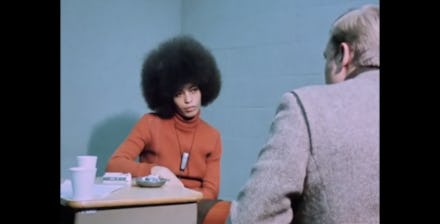Angela Davis' 1972 Prison Interview Perfectly Explains the "Violence" in Baltimore

Are the events in Baltimore this week a riot, or a rebellion — and the start of a revolution?
A rebellion is deliberate — even organized — violence against an oppressive institution; it is the constitutive act of a revolution. A riot, however, has no endgame other than creating disorder. The distinction is critical in how we understand what is going on in Baltimore right now. If you don't understand how that violence is a rebellion, rather than aimless, angry riots by "thugs," then you know nothing about the daily struggle of black and brown lives in America.
So, let Angela Davis explain.
The philosopher-activist and professor was hunted down by the FBI for a crime she didn't commit, jailed in 1970, and freed in 1972. While serving her sentence in a California jail, she gave a thoughtful interview (later included in The Black Power Mixtape) about the state of the Black Panthers at that time, and why violence is part of protest, because it is an inherent element in the daily lives of black and brown people.
Davis' point here is that people of color have very few outlets to pursue social, political and economic justice. This is why protest, done by the disenfranchised, the poor and the powerless, happens primarily on the streets.
Davis essentially argues the idea of a "peaceful protest" is an oxymoron. These acts of protest are a matter of physics: Every action has an equal and opposite reaction. As Davis explained, "because of the way this society is organized, because of the violence that exists on the surface everywhere, you have to expect that there are going to be such explosions. You have to expect things like that as reactions."
The daily experience: An everyday experience for a person of color is one of violence — the feeling of being policed, patrolled, and watched, constantly. It's psychologically damaging, to say the least. But Davis' point is, again, one about the physics of power. The irony that she draws out here (and one that Ta-Nehisi Coates elaborates upon in his new stunning piece at the Atlantic) is that black and brown people are deemed "violent" for simply expressing that they've had enough of living in the pressure cooker of racist violence.
This is why Baltimore is on fire, now, just as Ferguson, Missouri, was months ago, just like Los Angeles was over 20 years ago.
The question is, will this ever change? Will a revolution ever come?
Watch the segment in full below: